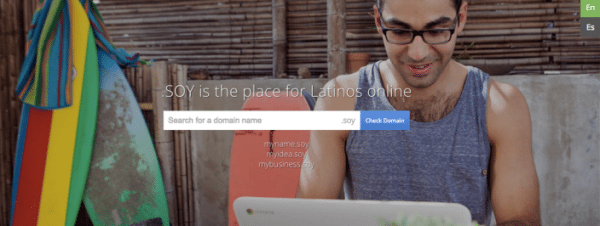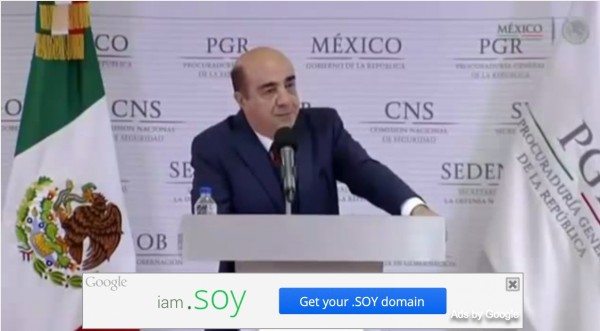To paraphrase that wonderful Al Pacino overacting moment by a tired Michael Corleone in The Godfather Part III, just when I thought I could walk away from Google’s .SOY initiative, they pull me back in.
You see, after people in our social circles (G+!) let Latino Rebels know about “the place for Latinos online” and after one LR contributor gave “The Age of Soy” its proper perspective, the conversation grew to other outlets. There was even a HuffPost Live segment about it all. Everyone we knew in the Latino digital space was asking: “To soy or not to soy?”
The result of such online conversation led to a range of reactions: those who thought the .SOY move was funny (yes, I still get texts such as “TTYL.soy” weeks later), insulting and silly, as well as those who thought the move was positive and celebratory.
There were those —mostly from Google’s initial .SOY partners featured on the campaign’s splash page— who told me and others that we were dividing the community and belittling authentic, well-intentioned efforts. Those critiques led to a suggestion that I talk directly with Google and ask them on-the-record questions about why did it decide to create a .SOY for the world. Soon enough, I reached out to Google, and within a few days, I was contacted by a member of the Google team who worked on the .SOY initiative.
Now I would love to tell you what that main 60-minute conversation was all about, but this Google team member said the company would not formally respond to my questions or have anyone available for an interview. That is, after talking “on background” and “off the record” for what was a very substantial amount of time, when I made a request for a more public conversation with Google to address .SOY, I got nothing.
Nada.soy, nocomment.soy, movealongnothingtoseehere.soy.
I tell you this because I was this close to givingup.soy and just letting the issue fizzle until this weekend. As people in our group were working on the #YaMaCansé story out of Mexico, we had to go on YouTube (Google!) to check out what the country’s attorney general had to say about Ayotzinapa. When we started watching the video of Mexican government’s official press conference, suddenly this showed up:
My Pacino Overacting Vibe had returned.
So after two conversations and several emails with the Google employee who told me that the company will not comment at all about .SOY, here were some of the questions I had hoped Google would have taken the time to address. As of this post, I can only report that Google won’t comment.
- Why did your marketing campaign specifically say that .SOY is “the place for online Latinos” when the Latino digital space has been so vibrant and active in the .COM, .ORG and .NET worlds for years? Why not change your copy to say “a place” and start celebrating and getting to know better all the pages that now provide the justification for Google to jump into this “hot” space in the first place?
- Can you see why so many people think your .SOY smacks of an attempt to make money off a community you don’t hire? Why are your diversity statistics so dismal and why aren’t you hiring more Latinos, especially Latinos in upper management positions? The candidates are out there, as USA TODAY reported this year. All the public events are great, but why aren’t you hiring?
- Why are some .SOY domain names close to $400? Did you ever consider price point in all this, and how even those domain names that cost $40/year are still considered expensive in this market?
- What do you say to those who believe that you are trying to segregate a specific population? How can people be reassured that you have the best interests of the community in mind?
- What was your market research plan in developing this initiative? How did you reach this decision and how many people did you ask about whether this campaign would be a good idea or not?
- Is .SOY specifically targeted at English-dominant U.S. Latinos, Spanish-dominant U.S. Latinos, bilingual/bicultural U.S. Latinos? The marketing message suggests that you are treating Latinos as one big monolithic group. Why didn’t you lead with Spanish and Latin America, since it appears that the initiative might have more appeal in Latin America than in the hodgepodge of U.S. Latinolandia. Am I missing something?
- Did your initial partners have to pay for their premium domain names or were those domain names given to them in exchange for promotion?
- How many domains have you sold since it has launched? One report says that there have only been around 1,100 .SOY registrations so far. Is that a solid start for Google, or is that a disappointing effort? Was your .SOY push an attempt to compete against .UNO? (Yes, there is also an .UNO domain name out there.)
- Will Google rethink its strategy to reflect the feedback it has received about this initiative? Will it pursue new ideas based on this feedback? If so, what are they?
I don’t know whether Google will answer these questions now or whether they will call me back to have a on-the-record conversation. I still stand by the impression that their background discussions I had with them were just a way to appease me and others who felt the same way and had valid questions to ask. If Google truly wants to be part of “the online space for Latinos,” you would think it would want to share its point of view on all this.
Avoiding the questions doesn’t help anyone, perpetuating the perception that a non-that-diverse Google really doesn’t care about what the community is saying. Just buy your $400 domain names, gracias.
I would think Google would at least want to answer some questions instead of not answering any of them.
OneCanOnlyHope.Soy
Meanwhile, our group does plan to survey people about it all. That should be out soon.
***
EDITOR’S NOTE: Julio (Julito) Ricardo Varela (@julito77) founded LatinoRebels.com in May, 2011 and proceeded to open it up to about 20 like-minded Rebeldes. A 1990 Harvard graduate in the History and Literature of Latin America, his personal blog, juliorvarela.com, has been active since 2008 and is widely read in Puerto Rico and beyond. He pens columns on LR regularly. In the last two years, Julito represented the Rebeldes on CBS’ Face the Nation, NPR, Univision, and The New York Times. Recently, he was a digital producer for Al Jazeera America’s The Stream.




